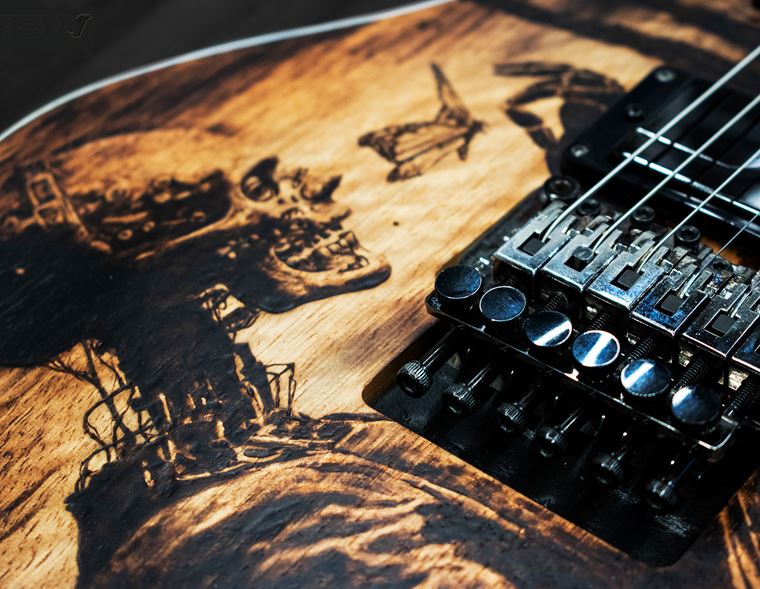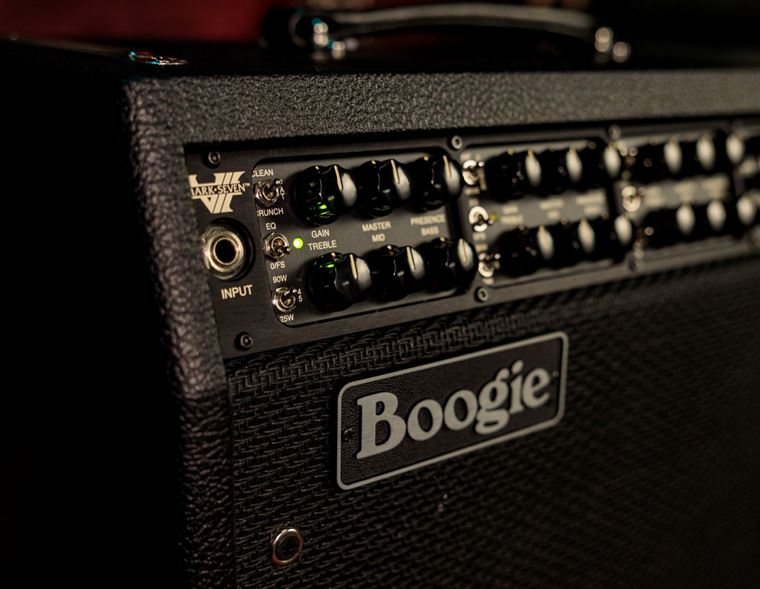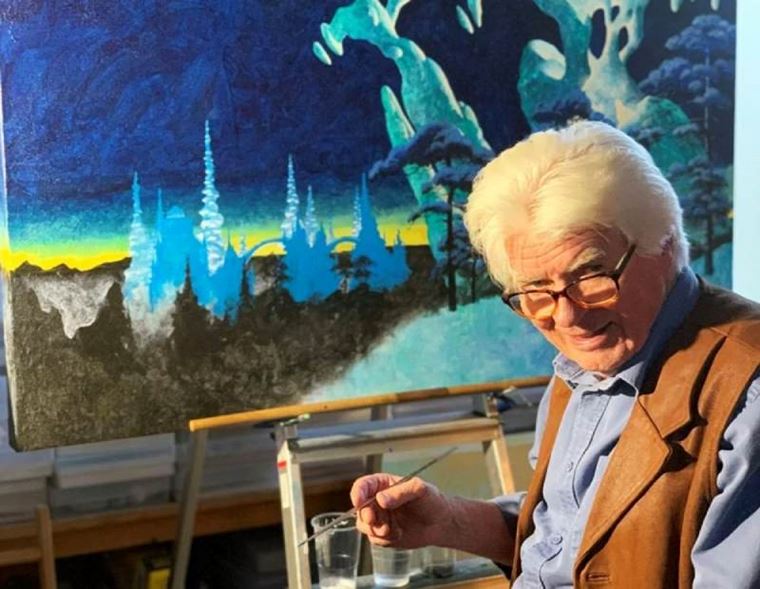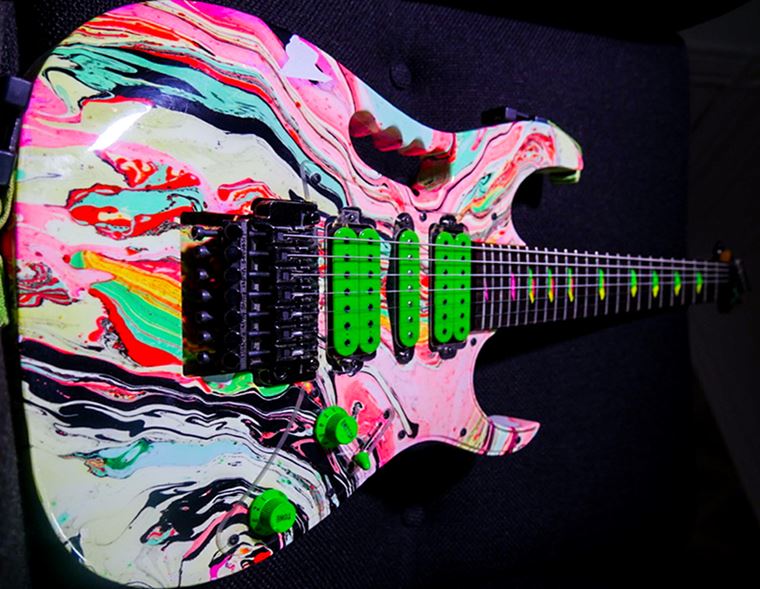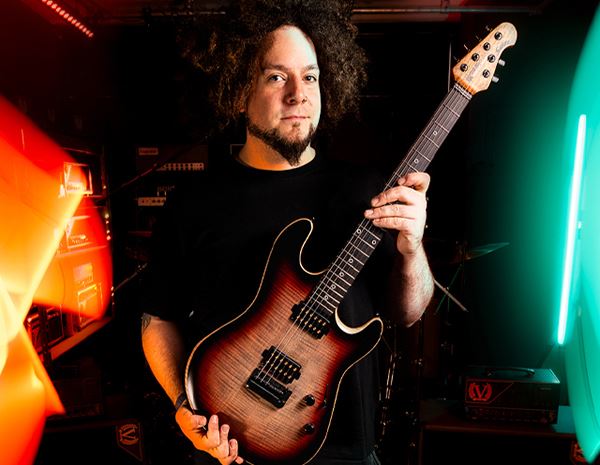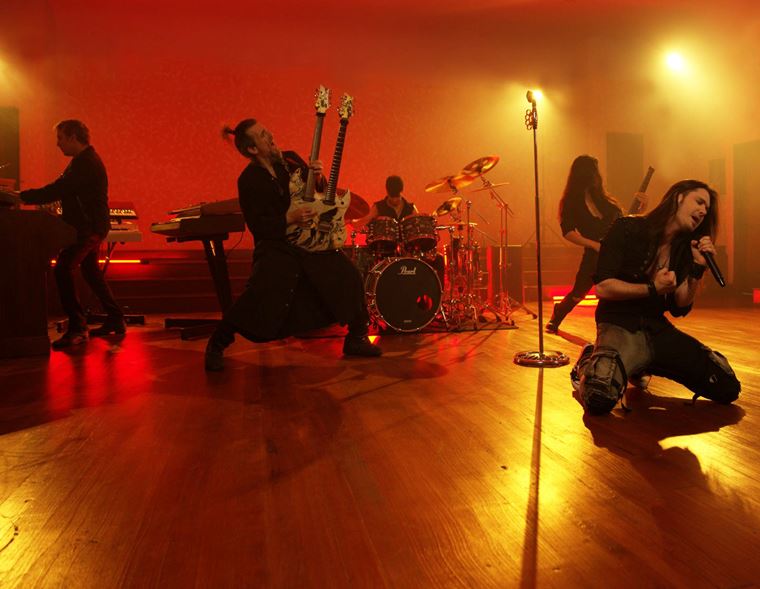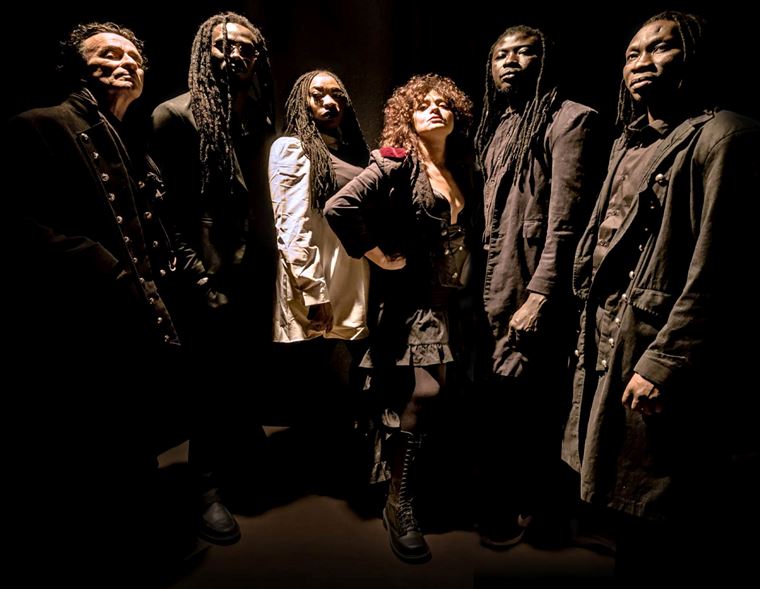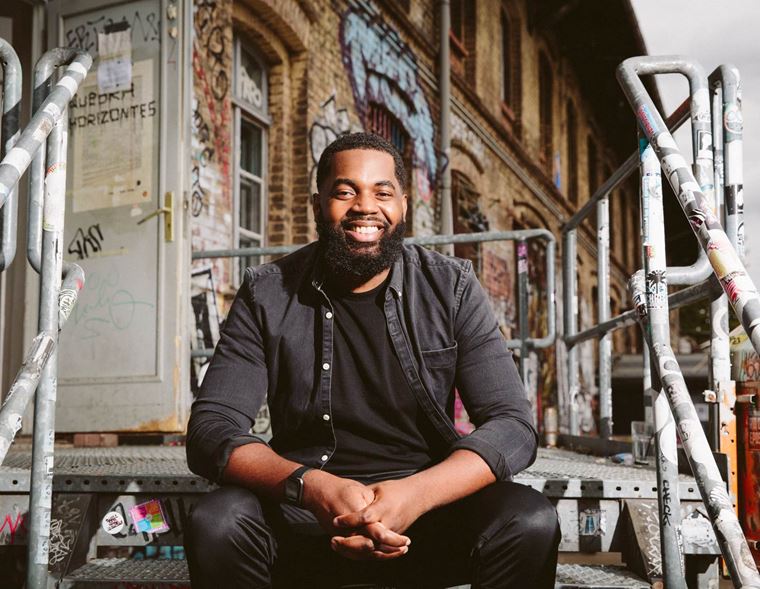The guitarguitar Interview: Paradise Lost
For music fans more attuned to a darker, more gothic perspective, Halifax’s Paradise Lost are a gift from the underworld. For over thirty years, the darkly intense quintet have made heavy music history with 16 diverse, imaginative and beautifully bleak records. From inventing the Death-Doom genre in 1988 with their debut release, Lost Paradise, through forays into dark electronica (One Second) and straight up Death Metal (2017’s Medusa), Paradise Lost have travelled some dark roads, bringing a windswept beauty to their subterranean explorations.
Their newest record, Obsidian, sees the band casting their net across a wide range of sounds and textures. Interestingly, in some ways the songs on Obsidian collectively hint at Paradise Lost’s collective past, providing an excellent, reflective, entry point for new fans. Though not at all intentional, this breadth of sound illustrates not only how talented the band are, but also why they have remained so popular and loved for over three decades.
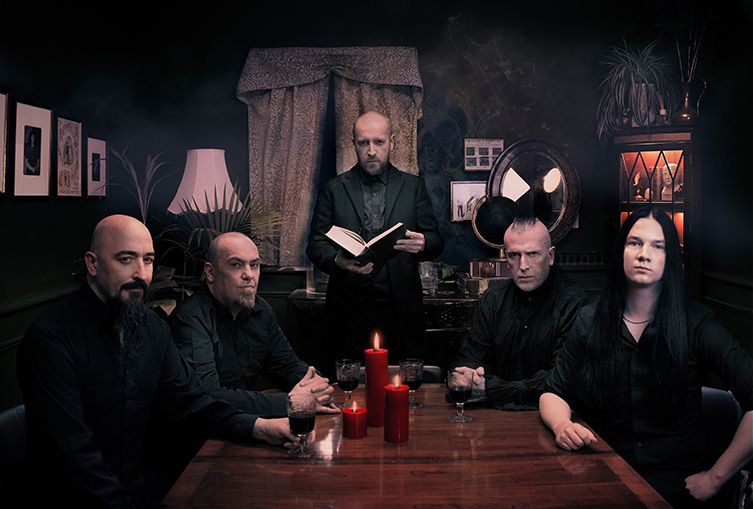
(Photo: Anne C Swallow)
A brooding acoustic intro (Darker Thoughts) makes way for the widescreen crunch of Fall From Grace, with its downtempo drama and doomy vocals. Ghosts brings a rhythm that’s perfect for Goth and Metal clubs, with plenty of scope for mosh-breakdowns! Elsewhere, their signature beauty is revealed in the gorgeous clean tones of The Devil Embraced, and the choir sounds of Forsaken. It’s a darkly gothic masterpiece, and one that has been met with enthusiasm since its release on the 15th May.
We managed to have a fantastic conversation with guitarist and co-songwriter Gregor Mackintosh ahead of the album’s release. We got on so well, in fact, that our allotted 30 minutes flew past us as we chatted about pedals, custom guitars and plectrum shapes! Another half hour was clearly needed and happily secured not long after, and we picked up where we left off.
It was fantastic to talk with such an experienced professional. Gregor’s insights on longevity, touring, and especially writing, are not only really interesting but highly useful to other musicians out there. The anecdote about the speaker cabinets alone is worth the read!
We had a good long conversation, and so this interview is both long and, hopefully, good too! Enjoy!
Paradise Lost Interview
guitarguitar: So, how are you getting on, Gregor?
Gregor Mackintosh: Yeah, I’m alright! Same as everyone else, probably. Isolation’s not a problem for me because I’m not that bothered about seeing many people anyway, but when you don’t have a goal in sight, like a gig or a festival or something, it’s hard to get motivated! Every day’s like: how long can I stay in my pyjamas before I have to get dressed! The motivation is a problem.
GG: That’s interesting, because you have your computer there, you’ve no doubt got lots of ideas, but it’s just getting those wheels turning and getting on with it. I’m kind of feeling the same way myself.
GM: Yeah, it’s just when you don’t have an end in sight, you know? If you’re not working towards a gig, or album or recording or something, it’s like ‘what’s the point?’, almost, haha!
GG: Yeah, totally! Well, having said that Paradise lost have the new album, Obsidian, out for release really soon! Are you guys still going ahead with the release during lockdown? I know a lot of other bands are unsure about what oy do regarding that situation.
GM: Yeah, ours is still coming out on May 15th. We were asked by Nuclear Blast to move it back and we said no. We didn’t see the point because, A) It’s probably more important that people have things to do being locked in, having books or films or music, and another thing is, you don’t know when the end of this is gonna be. I’m sure it’s gonna impact sales, but that’s gonna be across the board. I really don’t see the point in delaying it.
GG: Yeah, whether the listeners are gonna buy the physical product or not, they still want to have access to it on their devices, so you may as well make it available to them, right?
GM: Yeah, I mean, I think it’s something like 70% on people get their music online now anyway, whether it’s streaming or buying from an online show or whatever, so the only thing it’s going to impact is the record stores, of which there are not too many anymore. Or shows, where you sell product at shows. So yeah, it’s gonna affect things, but, talking to our manager, it seems like this could be a change that everyone has to adapt to permanently at some point, depending on what the outcome of this is.
GG: Yeah, yeah! So, you guys were playing a live showcase of the record later this year: is that, so far, still going ahead?
GM: That’s the idea! All we can do is work towards it. If it’s not allowed at the last minute then that sucks but that’s life, you know what I mean? So yeah, we’re working towards that, as many bands are working towards a certain goal, but looking at things as they stand now, in terms of having things in place, it’s actually not looking that good for a lot of things!
GG: No.
GM: You know, gigs might not even happen until next year now, I don’t know!
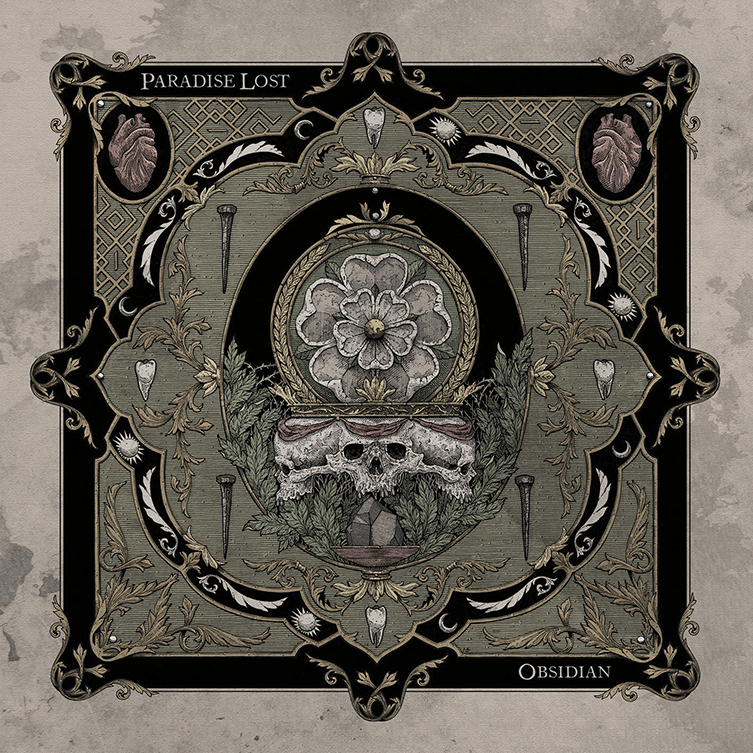
GG: Yeah, some are saying it’s an enforced year off. We’ll find out, I guess, but in the meantime, you do have a new record out, Obsidian! Given the overriding aesthetic of your band – romantic, gothic heaviness, I’d say – you have used quite a diverse bunch of sounds over the years. How do you see Obsidian fitting into that overall oeuvre?
GM: Well, after we did our last album, Medusa – which is pretty much a straightforward Doom Metal album – we just felt that we’d gone far enough with that and wanted to diversify. We didn’t know how, though, so we just took it a song at a time, went down a path...song of the songs on there are inspired by early 80s Goth music, some are more Metal, some I don’t even know where they came from! (laughs) So it’s a fairly eclectic mix on there! But I did an interview the other week and someone said to me it’s kind of like a musical biography of Paradise lost, because you can hear a lot of elements from mid 90s to late 80s in there! You can hear a lot of different parts if you listen closely. I don’t mind that analogy at all! It’s not something that was intentional but, as well as having some newer elements, I think it’s got most of the elements that we’ve used over the years on one record.
GG: Yeah, so there wasn’t some grand plan to use that all-encompassing, wide-eyed lens: you simply created the songs as you found them?
GM: It was just about trying to sound more diverse, really. Wherever that took us! But, ultimately, we are the same musicians: we have a certain style of playing and that’s going to colour the record anyway, so you’re gonna end up with a Paradise Lost record, but slightly different that some of the others.
GG: Yeah, however you play, it’s gonna be Paradise Lost that comes out.
GM: Yeah, you can’t change how you play, whether you like it or not! You develop and style. I mean, you can try to sound as different as you want, but we have a certain style of songwriting and style of playing the kind of stuff that we like to write. I mean, we’ve had various different styles over the years: we’ve done an electronic album and we’ve done a Death Metal album and everything in between...
GG: Sure.
GM: ...and I think what ties it all together is this feeling that we have running through the songs. I mean, I think of songs, even when I listen to music in terms of mood: how does it make you feel? We have this melancholic, bittersweet thing that runs through all of our stuff, and I don’t think that’s ever gonna change, really.
GG: It’s kind of like the music all comes from the same land.
GM: Yeah! Which is, the grim North of England, I suppose! (laughs) You know, the shut- down, industrial Northern town!
GG: That’s an interesting point! Do you reckon that the fact that you’re from a slightly more... I don’t want to say grim and industrial because I’m in Glasgow! What am I talking about? (laughs) But you know what I mean: you guys aren’t a London band and you’re not from, like Spain...do you think that where you came through has a bearing on your sound, no matter how much your imagination plays its part?
GM: I would’ve said no if you’d asked me 20 years ago or 30 years ago, because I like to think that we were breaking out of that area and that what our fathers were like was not indicative of what we were like, but as I’ve gotten older, I’ve realised that there’s no escaping it. It’s in your veins: how you’re brought up. We were up brought up very sort of working class, Northern English town: quite poor, brow-beaten, downtrodden outlook on life.
GG: Mm-hmm.
GM: This self-deprecating sense of humour. It’s just indicative of the whole thing. So, yeah, I think it’s ingrained in us which in turn ingrains it in our music. I think a lot of people who came from our area, I guess, tended to go down the same path in the music scene. A lot of the Goth scene came out of Leeds/Bradford so I think, yeah, the ‘green and the grey’ thing is probably ingrained in it somewhere.
GG: It’s interesting how that happens, isn’t it? So, with Obsidian is there an overall narrative sweep to the songs?
GM: Again, it’s one of those things: it’s not something that we panned for and it’s not something that we tried to do, but with the previous album, Medusa, because the album was a lot more aggressive, the lyrics tended to be more nihilistic. On this record, the music is far more reflective and introspective, and that’s happened with the lyrics as well. It’s almost like an inward looking album: questioning the concept of regret, hopes for the future. You know, there’s some stuff on there that’s like, when you have dreams when you’re younger and life smashes them out of you. Just reflections on life, really. Not necessarily...there’s no answers in there, just questions. Questioning the whole thing: why people have regret, because it’s a pointless emotion.
GG: Yeah, that’s true...
GM: Hindsight and things like that, it’s all stuff that’s interesting, and as you get older, you become more aware of. I guess that’s how the lyrical content of this album came out: because the music was heading that way.
GG: And with the album’s title, Obsidian...I won’t pretend to be any kind of expert, but from what I gather, Obsidian is a powerful stone for things like psychic protection and so on. Is that something that you guys have an interest in? And did that play a part in the naming of the album? Maybe using the music as a talismanic, protective sort of thing?
GM: Well it’s a mild interest, but we absolutely don’t believe in it. It’s all complete bullshit, you know? I’m a science man, I’ve been an atheist since before I can remember. I don’t believe in a lot of spiritual stuff either. But, when we were thinking of, not ‘concept’ for the album – that’s too strong a word- but sort of a theme for the artwork, initially, we liked all the iconography and symbolism of the Pre-Christian, Pagan-type stuff.
GG: Sure.
GM: And obsidian, yeah, we just did a bit of research. We liked the word, for a start; we knew it was a black, shiny, volcanic rock and it was used in all these rituals. If you’ve seen the artwork...
GG: I have.
GM: Yeah, that’s how that all ties in. It’s all symbolic stuff from that Pre-Christian era when people worshipped rocks, the Earth, animals and whatever else. We’ve kind of put that all together in the album artwork and title, but like I say, it’s not something we believe in, but it’s an interesting thing to look into, and it was a good way of tying things together for us.
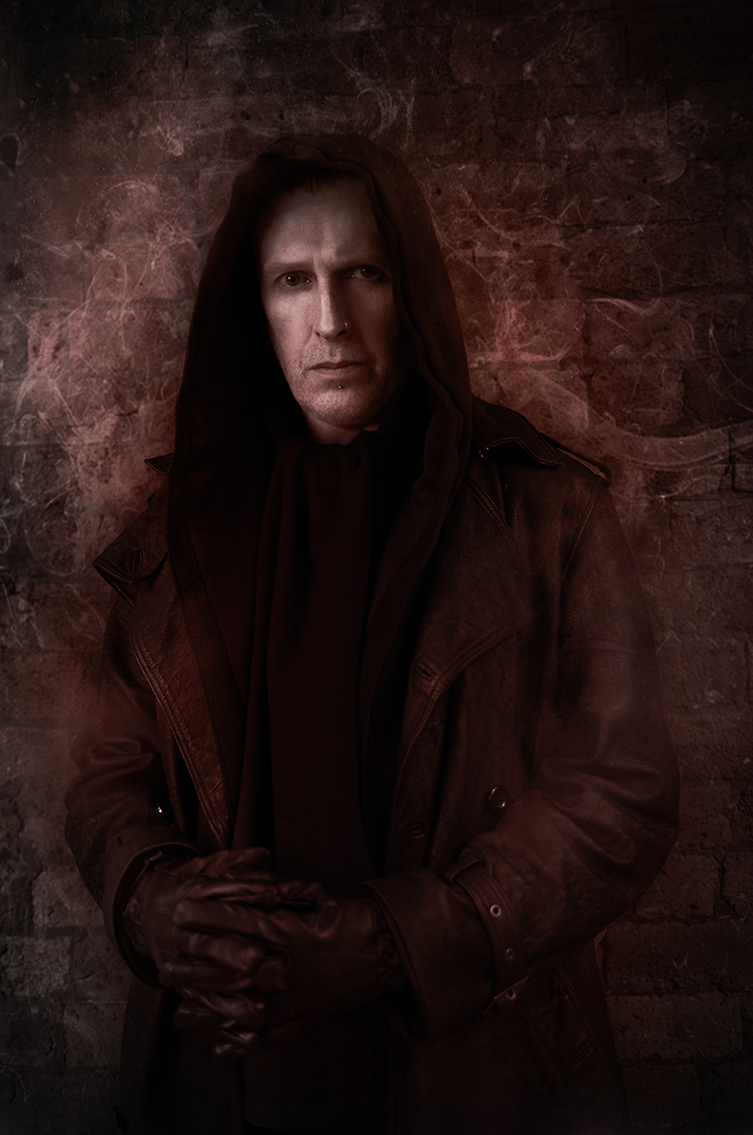
GG: Okay, and in terms of the songs themselves, before we get down to the fun stuff with the guitars and everything, was the writing nucleus this time around yourself and Nick, as it normally is?
GM: It was but we changed the way that we write songs this time. A couple of years ago, I read an article about David Bowie and how he wrote lyrics, which I found really interesting because he used to write lots of words that he found interesting on a piece of paper, and then cut them up and threw them on the floor to see what stood out to him. Like random sentences.
GG: Yes, indeed he did, in his Berlin period.
GM: Yeah, and I thought: what if you could apply that to music? So I started to do things like writing very short pieces of music – like, no more than a few seconds – and I’d give them to Nick and ask him to do four or five vocals lines over them, like a deep vocal, then a falsetto, a harder vocal, whatever. And then he’d hand it back to me and I’d strip all the music away and rebuild it, almost like a thousand piece jigsaw without a picture. What we found is that it’s a much quicker way of writing for a start: it’s more intuitive, and you end up with results that are surprising! You come up with things that you may not have thought of in the first place, because you would’ve initially been too precious about any given part. But writing it this way, nobody’s precious about anything: it’s all about the end result. It takes you down paths you wouldn’t necessarily think of going. It took us only six months to write the album from start to finish, and it would usually take us about a year! So yeah, it was a good decision!
GG: I’d say so! So, for example, let’s just invent something here: you’d maybe come up with 8 bars of a chord progression with a clean sound. Would you work up a groove underneath it and send it across to Nick? Is that how it would work?
GM: Initially, I would keep it as simple as possible. It could be a piano line, a pad (synth string sound - Ray), an acoustic guitar...I’d try to avoid doing anything too riffy on this record because it wasn’t about that. And I didn’t want to colour Nick’s judgement of what was gonna happen. So then he would come up with his four or five versions of his singing lines. Maybe two or three versions of the same melody, maybe a different melody, maybe a rough vocal, and then he’d give it back to me. I’d strip the whole thing away and start building.
GG: And would Nick say to you: here’s my five ideas, I like numbers one and four the best? Or would he let you decide?
GM: No, he would just give them to me and then I’d give it back to him in a more complete version but still only maybe a verse or something like that. He’d go, ‘Wow, I didn’t think of that vocal line going there’, or vice versa. You get surprised! It’s kinda like a lucky bag of songwriting, in a way, but so intuitive.
GG: That’s amazing! Does that mean you could take those parts, different takes and disparate elements, and come up with, like, Obsidian II, which has the same content but arranged and presented in an entirely different way?
GM: Absolutely! There was probably about five different versions of the record before we decided what path we were going down. It’s like a multiverse: there’s four or five different versions of each song going before we decide what path to go down.
GG: That’s so interesting.
GM: Well, you’ve got to keep things fresh for yourself, especially when you’ve been going a long time. It’s a constant learning curve for me. I never claimed to be an authority on anything in particular. I’m constantly surprised by reading things on musicians and other artists: you’ve just got to take things in and try them: adapt them to your own way of doing things.
GG: Yeah, that has obviously reaped some benefits and I’ll be taking some notes for myself there! So, one thing I’ve noticed with Paradise Lost’s music, and it’s something you guys do really well, is mixing the dark stuff with the beautiful stuff. Is that a thing for you artistically, to balance the brutality with more beautiful elements?
GM: I think that’s where we shine as a band. We just don’t like to be too repetitive, more for ourselves than anything else. It’s not trying to pre-empt any particular audience. It’s like, there’s always gonna be a place in this world for the Motorheads, the AC/DC’s and the Slayers, but I kind of question, a lot of times, the authenticity of a lot of bands when they stay the same for so long. It must be like working on a production line or something! I just don’t get it, myself. Yeah, so I think we shine when we’re blending those elements, but it would be too boring to stick to a particular format just because we know we’re predisposed to being better at it. You have to test yourself, you know.
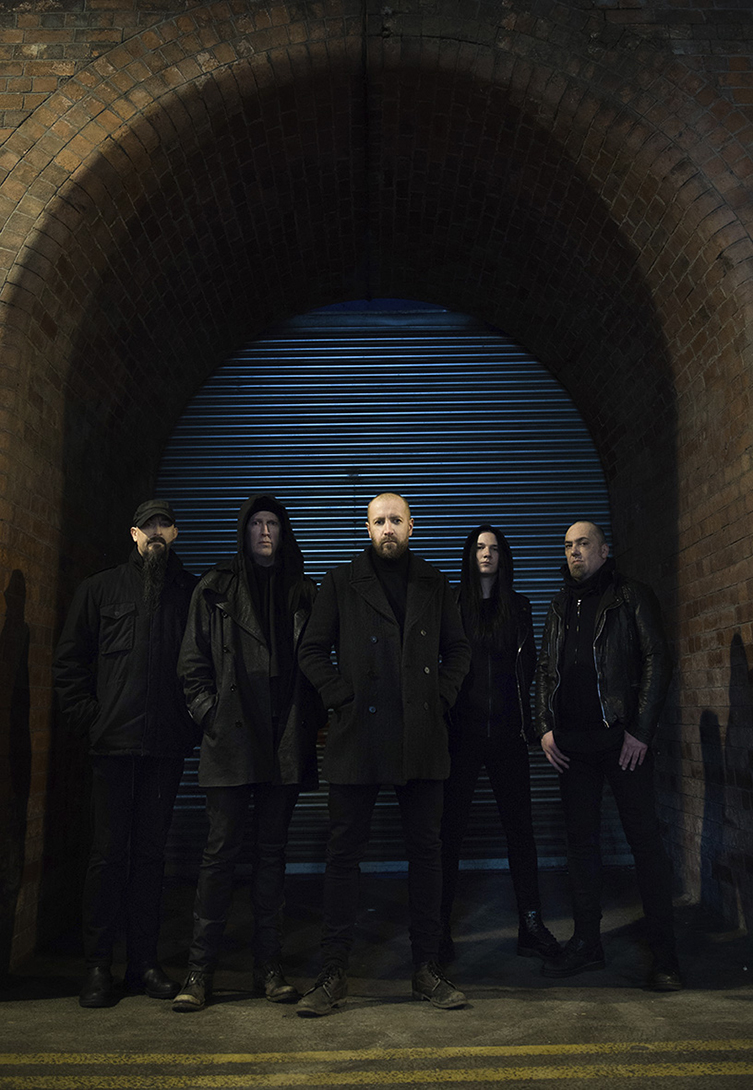
(Photo: Anne C Swallow)
GG: Yes, absolutely! So, dynamics would be a part of that as well, yeah? Not even so much with instrumentation, but the dynamic of the overall mood can change a lot, I noticed. And also, Nick’s vocals are quite varied from singing to growls and so on, so are dynamics big for you as a musician?
GM: It’s absolutely key to a song’s outcome, I think. When you think about heaviness in a song, for instance, it’s only heavy relative to what’s either side of it. If it’s constantly heavy, it loses its meaning. Same goes for anything: atmosphere, for example. So, it’s all to do with crescendos and light and shadow.
GG: Definitely!
GM: Yeah, you have to build and dip, build and dip. Not just within a song. We’re very keen when we make the album’s running order, it has to do a similar thing. So yeah, it’s all about those crescendos, those highs and lows. To keep everyone interested – the musician and the listener – you have to be drawn in. It has to direct your ear and your mind to whatever’s going on. When I listen to music, I like to picture things. If I’m listening to a band, for instance, it might make my think of some thunder rolling across the sea, or whatever, you know?
GG: Oh yeah, totally!
GM: That’s how I think of music: in terms of that rather than musicality sometimes, because that is ultimately what you take away from it.
GG: Yeah! That’s interesting about hearing the music and seeing the vision, because when I was checking out Obsidian, I kept getting visions of a really good black and white photo of a dark forest.
GM: That’s great! I love these kind of analogies! Very few people give me analogies, but I do love it were people say, ‘this reminds me of this’ because it’s much better than just saying, ‘it sounds like this’, or ‘it sounds like that’: that’s just boring! I always thought that when reading reviews: what’s the point in mentioning ten other bands? Just paint a picture!
GG: Yeah, totally! It’s pretty reductive otherwise. There’s also, for me, the image of waves breaking on a desolate shore, like that book Dark Matter by Michelle Paver, not that I want to be too specific, haha! What does Paradise Lost sound like to you?
GM: Well, it depends on the era! Albums, to us, they’re all like snapshots. We don’t have any regrets, because whatever albums we did, we were 100% into at the time. So yeah, it depends of the era you’re talking about, but I’d say a concurrent theme that run throughout music, it is that green and the grey thing that I was talking about, probably. The big, dark, closed-down mills and in the background these nice, green, rolling hills, you know!
GG: Yes, it’s very evocative. I don’t think you could’ve said it better than that, it’s fantastic!
GM: Hahaha!
GG: So, obviously, this is for guitarguitar, so let’s talk guitars!
GM: Yeah!
GG: Now, I read somewhere that you are mostly 7 string-based. Is that the case?
GM: Yeah, but that’s only because I trained myself to use 7 string guitars rather than 6 strings. Over the years, we’ve had so many different tunings on albums. Rather than keep tuning up and down during a gig, or changing guitars, we decided to transpose everything and play it on 7 string guitars. So, it wasn’t like we wanted to do everything really deep and down-tuned.
GG: Right, it was more practical.
GM: Yeah, and we just carried on because of that. It gave me the scope to not have to change up and down with all these tunings we used to do. So yeah, I just kept it like that because I quite enjoy it. I quite like thin but wide guitar necks, I don’t know why, I just do! (laughs) So it works well for me.
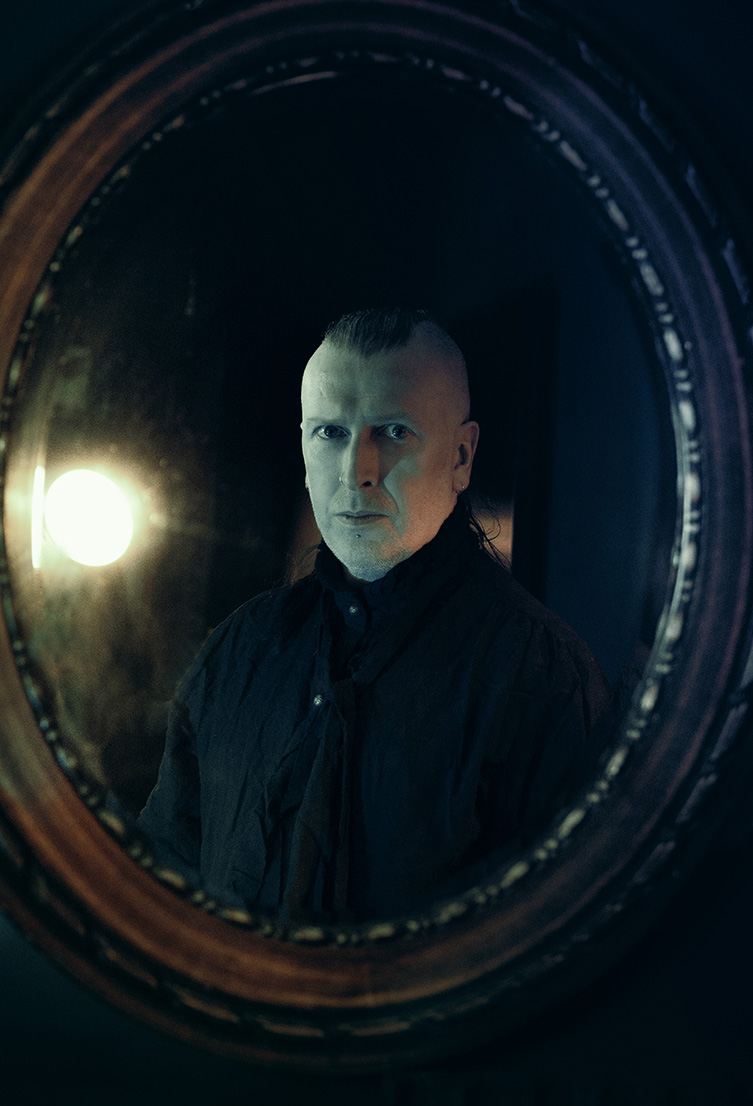
GG: Absolutely! So, when you were tracking guitars for Obsidian, what kind of gear were you using?
GM: Well, I’m sponsored by Framus, so the majority of what I use are those: Pantera models and V models. They’re all very customised to what I like them to be. I have two V's, Maple bodies, Maple neck and Ebony fingerboards. I have one with a Floyd Rose, but I keep that for studio work. I don’t take that on the road. The Pantera looks like, I don’t know, battered tin!
GG: Oh, cool!
GM: It is metal, but it’s like powder-coated or something.
GG: Yeah, I know what you mean! That’ll fit in well with Paradise Lost’s kind of visual vibe.
GM: Well, I think so! When I got it, I said, ‘Oh, this is great!’ and our guitar tech said, ‘Looks like you’re in Gary Glitter’s band’, which broke my confidence a little bit.
GG: Awwww, why do people do these things to each other? (laughs)
GM: Haha, I don’t know! But also, I used Framus for a lot of the acoustic stuff, and a lot of the soundscape-y stuff. For a lot of the rhythm stuff, I actually just bought a new guitar right before the recording, by a company called Hapas guitars out of Berlin. It’s like a small workshop, but I saw them and thought, ‘I’m gonna give these a try’. I bought one that came before the recording and I’m so impressed, I’ve ordered another one. I did nearly all the rhythms with that. It’s called a Deus 727 and basically their take on an Iceman.
GG: Aw, nice! I love the Iceman! It’s my favourite ‘shape’ guitar. What kind of spec are we talking?
GM: It’s very, very basic! (laughs) It’s crazily basic. It’s an Ash body, which I’ve never used before. It has a Maple neck, which I’m used to, I usually have Maple and Maple, but this has the Ash body. It’s their own hand-wired pickups, which are passive but kind of hot. 7 string again and baritone scale but the neck’s sunk so far into the body, it feels like I’m playing a 25.5” scale guitar.
GG: Ah, cool! Yeah, it makes a difference on the other end.
GM: Yeah, so if you’re hitting some of the real low stuff, it still feels tight and snappy but it doesn’t feel like I’m playing this huge, long thing, you know.
GG: Haha, totally! So, what sort of strings would you use for that?
GM: Well, we were using steels. I like them to stay bright for as long as possible because I’m just so lazy about changing strings! I’m constantly getting moaned at by producers, you know, ‘It’s time to change your strings’. I’m like, ‘Oh, come on! Can’t we squeeze another couple of songs out of them?’ (laughs) It’s the most tedious job on earth.
GG: Haha, I don’t mind it, actually! So is it like gauge 10 strings?
GM: I use 10 up to 65, actually. It’s like a 10-52 set with a 65 on the bottom, I think. Something like that. It’s just to keep that low string in check. You know, I don’t use the 7th string all the time, but it’s nice to keep it in tune, haha!
GG: Yeah, definitely! And what’s the lowest you would tune that to? Do you stick to the ‘B’, or does it go lower?
GM: Yeah, the whole guitar, if it was a 6-string, it would be drop D, and then there’s a low ‘A’ string.
GG: Got you. And what about plectrums? Do you have a favourite type of pick?
GM: Yeah, I like heavy ones and I usually go for the big triangles. It was something I started using years ago because our other guitarist used them. I lost a pick one night and borrowed one of his. I can’t believe it took me so long to realise that it doesn’t matter which way around you have the pick: you can spin it around in your hand! Haha!
GG: That’s exactly it! I don’t understand why more people don’t use them! Every edge is a playing surface, you know!
GM: Yeah, because before that, I was using Sharkfins and they were a pain in the arse. Also, the triangles fly well if you throw them into the audience: they go like a boomerang!
GG: There you go! That’s the experience of being on the road! Haha! You need to know which plectrums fly the best! So, one of the things I touched on earlier, but wanted to hear more about, is your clean sounds. I’d say it’s actually harder, these days, to get great clean sounds than it is to get good crunch tones. Do you use different equipment to get your clean sounds?
GM: Well, I tricked our producer on our new record, because I borrowed a mate’s Telecaster, and some of the sounds are this Tele. And then, because a good mate of mine does the Positive Grid stuff, I thought I’d try out their guitar-match thing, you know that?
GG: Yes indeed.
GM: In the Bias FX 2. I thought I’d try the Tele on that, with one of my Framus guitars. So, one of the tracks is my normal guitar through the Bias FX 2, making it a Tele.
GG: I’m with you. Very cool.
GM: The rest of them were an actual Tele, and the producer couldn’t tell which was which, so I was happy with that.
GG: That’s a good little litmus test, that, isn’t it?
GM: Mmm-hm! I mean, I sent them through completely isolated and he couldn’t tell! I mean, he guessed a couple of times and got it wrong, so...
GG: That’s fantastic! So, with the more ambient sounds, do you tend to record with them on the sound to begin with, or so they come after via plugins and so on?
GM: I prefer to record with them on because it’s more about how the effects play off you as a player. Some of the kind of more far-out, electro-acoustic sounds, more like washes, on this record, I did by putting the time-based effects before the distortion, or before the amp. It’s a trick they used to do in the early 80s in Post-Punk, Goth music, and it gives you this really spaced-out wash sound. It’s a lot more one-dimensional when you hear it on its own, but when you put it inside a mix, it creates this great kind of wall of sound-type of ambient thing, you know?
GG: So is that like putting a delay pedal into the front of a distorted amp, for example?
GM: That’s right: and Chorus and maybe Phaser as well, all before.
GG: So it’s really noisy and exaggerated rather than subtle?
GM: Yeah I mean the cleaner, cleaner sounds, its all added afterwards – or post-amp – but the stuff where you just want to experiment with sounds and create some kind of crescendos, I find that just doing stuff like that is just really intuitive for a player to use. You get some really weird tails when you finish a note. You get some interesting stuff there! It’s almost like keyboard pads or something.
GG: Yeah, that’s exactly it. I was just about to get on to keyboards, but before I do that, that’s a really good tip to take away: in this day of Kempers and Helixes and Axe-FX etc, we can mess around with our FX chain really quite easily. People at home reading this could dial up what you were just talking about there in thirty seconds. It’ll completely transform their rig!
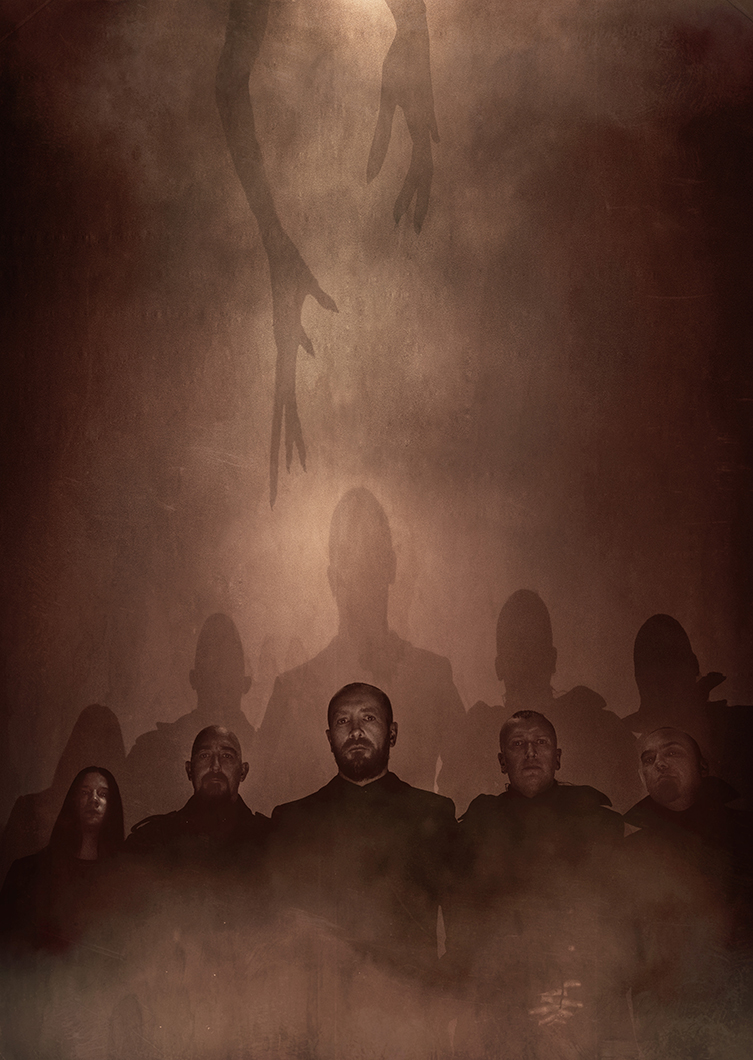
GM: Absolutely! I mean, I’ve had mixed results when trying that kind of thing with the Kemper. Just because some of the effects don’t react in the same way that a hardware one would before an amp.
GG: Interesting.
GM: But it’s definitely getting there! It’s very close. But I’ve just got this huge box of pedals: some extremely old, some new, and I love pulling them out, daisy-chaining them and seeing what I can get out on them, you know?
GG: Do you have any particular favourites that you’d hate to lose?
GM: Well some for sentimental reasons, like, I’ve got an original Rat pedal that I used on the first Paradise Lost record and the first gigs. I’ve still got that, and the plate’s missing off the back, it’s just gaffered up. I’ve got some really good fuzz effects by a guy called Minotaur Effects, a Greek guy who makes them. Kurt Ballou (Converge guitarist) has just sent me one in the post, actually, a new one he’s made in Godcity (a studio in Salem, Massachusetts - Ray). He sent me a video of it and it’s got so many knobs on it, it’s insane! You can EQ it to death!
For some reason, I’m kind of more obsessed with distortions, fuzzes and overdrives and stuff. With a lot of the time-based effects, I’ve found the best results with the original Ibanez Phaser and Super Chorus, daisy-chained. I love those two, and a lot of the guitarists I’ve met over the years that I’ve admired, or my peers, I’ve found that they have the same sort of pedals on their boards. Gaz, who was in Cathedral, he had the same phaser and chorus, and used them in the same conjunction that I did. It’s just a tried and tested thing: it’s like a 57 and a 421 on a cab, you know what I mean? It just works. I don’t have a huge pedalboard with loads and loads of expensive pedals. I went through a phase of that, and I found that it just wasn’t doing anything particularly noticeable.
GG: Did you find that you just went back to your old favourites?
GM: Kind of. I think maybe the longer you do this for, and the more experience you have of playing live in different venues all over the place, you learn to just sort of streamline your rig as much as possible, so that is still sounds great through a PA. It doesn’t matter how you do that. I’m constantly surprised over the years as to how some people get their tones. It’s like, ‘wow, it’s that simple!’, you know?
GG: Yeah! It’s the classic chat about the big walls of guitar cabs on stage that look amazing, but then you go back behind them and they’re all empty! There’s one small combo that’s mic’d up and that’s the ‘huge’ sound!
GM: Well, we did that at one point in the 90s, but that was because we had to smuggle our merch across borders.
GG: Ah, wow! So you stuffed these empty cabs with t-shirts?
GM: That’s what it was! The cabs were full of t-shirts! (I laugh in amazement) We all did it! It was because, when you got to a border in Europe, they’d just blackmail you and nick a load of your merch. The border guards, you know?
GG: That is so great! I did not know that, and I’m so glad I flippantly brought that up! Hahaha! Brilliant. So, see your phaser and your chorus: do you have any preference over which one comes first in your chain?
GM: Ah, normally, I would have the chorus first and then the phaser, but it depends. When I’m recording stuff, I tend to just mess around and see what gets me the right feel! It’s like cocking a wah for a tone: you mess around with it and get it in the right position. It might suit for this part but nor for the next part, thirty seconds later.
GG: Yeah, sure.
GM: That’s recording, but live is a completely different scenario. You do an approximation, and try to get it as close as possible without all the hoo-ha.
GG: Yes indeed. Close is close enough! And you mentioned about keyboards? You play most, if not all, of the keyboard parts on the Paradise Lost records as well, don’t you?
GM: Yeah yeah! I used to have a huge collection of hardware keyboards. Mainly Korg but also some Ensoniq stuff as well, that I collected...well, throughout the 90s, really. I kept using them through various guitar pedals. Mid-way through our career, when we did more of the electronic stuff, my idea was to kinda sample guitars that I was playing, and then distort the keyboards that was playing, so you wouldn’t be able to tell what was a guitar and what was a keyboard.
GG: Nice!
GM: That was the idea at the time, but over the years, it’s kind of...you know, studios have gotten smaller and smaller, I’ve gotten rid of most of my hardware stuff, and I find that Omnisphere (Spectrasonics’ famously advanced synth software) does pretty much everything I need it to do these days. You can get these third-party packs for it that do some amazing ambient swells and crazy sounds. Anything that that doesn’t cover, you’ve got an amazing amount of orchestral stuff from Spitfire Audio, Konkakt libraries...When I’m writing stuff, with drums, I tend to use a mixture of the Slate stuff and Kurt Ballou’s own room stuff, which is a Kontakt instrument. Our drummer plays an electronic kit and we just piss around between us, both with the same software.
GG: Do you often go to the keyboard side of things, or the plugins, to write instead of the guitar?
GM: It completely depends on what type of song I think I’m starting off writing. (laughs) You know, it depends whether I’m wanting to colour our vocalist’s judgement of what the song should be: what I think it’s going to be. So if I’m wanting to do something that’s a little more catchy and has more of a melody to it, I might start off with just a pad sound or a bassline. Something very simple and not too distorted, to not colour the judgement of the vocalist. And then if I’m thinking I want something that a bit more riff-orientated, I might start with a guitar line. Usually, more often than not, like what I told you with the songwriting process we use these days, it can go completely in the opposite direction after you start, anyway!
GG: It was such a breath of fresh air to hear about that whole process! Very cool. So, that’s pretty much everything covered, Gregor! I’ve got one last question, which is the most generic thing ever, but I’m still interested in the answer! Paradise Lost have been around for over 30 years, with largely the same line-up, apart from drummers. Most bands don’t achieve that type of longevity, so what is your secret to staying together as a band?
GM: Umm, well, sense of humour is very important. We have the same sense of humour: self-deprecating, Northern wit. We were brought up in very similar surroundings, which is a working-class, downtrodden mentality, so that mixed together with a bit of friendship. Over the years it hasn’t been easy, but as you get older, I think comfort comes into it a lot.
GG: Right?
GM: Like the rest of the band members are like a pair of slippers to me, almost! It’s someone you know really well and are comfortable with. When we go on tour these days, rather than get the most expensive tour bus and maybe share it with another band, we’ll go for a half-way good tour bus and have it on our own, so we’re comfortable in our own surroundings. But yeah, it’s a learning thing. As you get older, you learn how much you can push someone’s buttons and how much space they need, and you just grow into each other. That’s a horrible way of putting it (laughs)!
GG: You’ve kind of creating a sort of micro-universe with the members and that sort of sustains itself.
GM: Yeah, and we’re kind of very antisocial as well (laughs). When it comes to other bands and stuff. I mean, we’re friendly, but we’re very well-known at festivals for kind of standing in a circle, talking to each other and not assimilating with anyone else, while all the American bands are jumping up and high-fiving each other and whooping at the top of their voices.
GG: Well, I think that befits you, as Paradise Lost, to not be behaving like that, quite frankly. (laughs)
GM: Haha, yeah, it’s a very English thing to do.
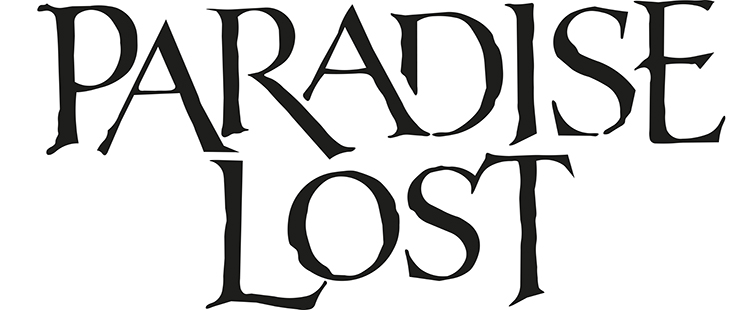
Indeed it is. Our time came to a close, as it always does. After two phone calls with Greg, we managed to amass plenty for guitar fans and Paradise Lost fans too! We particularly loved Gregor’s insights into this new way of songwriting for them. That could work for you, too! What not give it a try? We hope that Paradise Lost’s showcase gig goes ahead, and that they are back on the road soon! Keep up with them via the official Paradise Lost website. Obsidian is out now! We’ll remind them to bring their empty Marshall cabinets when they finally venture overseas again!
We’d like to thank Gregor for his generosity with his time and candour, and to Simon Glackin for helping set this up.
Thanks for reading, stay safe and we’ll see you soon.


